A Rebirth and a Reawakening
AR Staff, American Renaissance, August 14, 2023
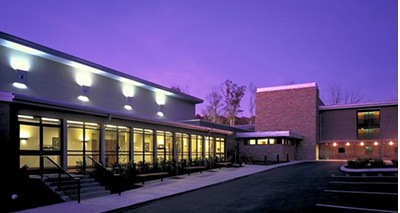
Subscribe to future audio versions of AmRen articles here.
“They have tried to shut us down, and they have failed,” said Jared Taylor, “because here we are and here will we remain.” The 20th American Renaissance conference was a milestone, not only in terms of numbers but because it showcased a movement that accepts and even relishes the magnitude of the threats we face. Greatness demands challenges, and this is a movement ready for greatness. After his heartfelt remembrance of the late Dr. Richard Lynn, Mr. Taylor did not offer a minute of silence. Instead, he called for bold speech and courageous action.
There were a few scattered protesters. As usual, they were so far away, most of us didn’t even notice they were they there.
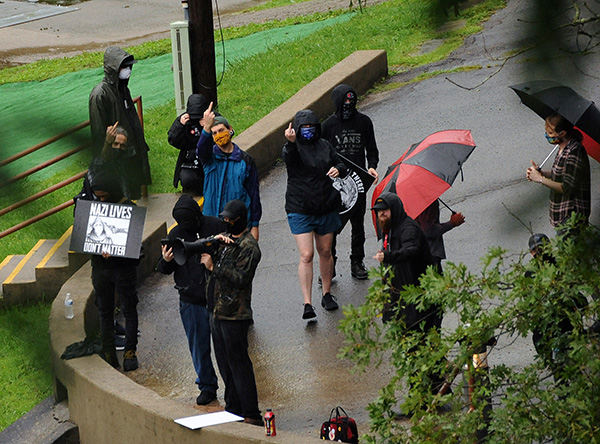
A handful of protesters reduced to impotent gestures.
Dr. Richardo Duchesne gave a deeply challenging talk, attacking the idea that “Cultural Marxism” or another recent innovation is responsible for the decline of Western Civilization. Instead, what we face is arguably the endpoint of civilization as liberal pluralism reaches its logical conclusion.
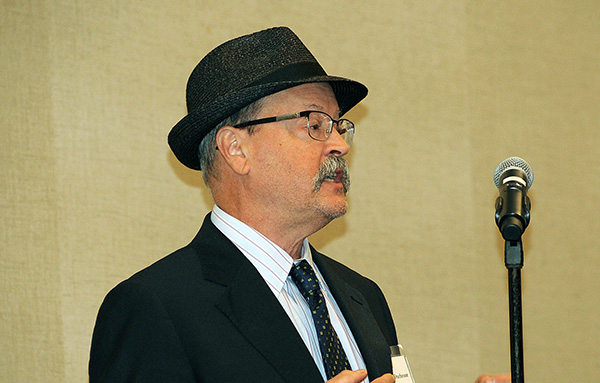
Dr. Duchesne said John Rawls was the most influential political philosopher of modernity, rather than anyone from the far more infamous Frankfurt School. Rawls argued that the right of everyone to determine his own morality, free of any collective standard, is regarded as “settled” and unchallengeable by reasonable people. Liberal pluralism is thus the heart of modern Western morality. Any attempt to impose collective moral standards or to asset a common purpose must therefore be suppressed to preserve individual freedom of conscience. The assumption that every person has the right and ability to make his own choices leads inexorably to egalitarianism and the liberal immigration.
Dr. Duchesne described modern Western history as one long story about the progressive elimination of restrictions and standards for voting and political participation. He argued that these ideas flow logically from the principles of John Locke and John Stuart Mill. Though many Western leaders, notably the Founding Fathers, took white racial identity for granted, Dr. Duchesne said the principles they espoused made it logically difficult to oppose even the most radical egalitarianism. Citing the Russian political philosopher Alexander Dugin, Dr. Duchesne argued that white racial survival requires the development of a fourth political theory beyond liberalism, fascism, and communism, though he warned that the project of overcoming liberalism will be extremely difficult.
Keith Woods spoke of the struggle of nationalist Ireland against immigration. He said Ireland was founded on ethnonationalist principles, and “Old Ireland” was a society of the kind today’s ethnonationalists dream of. He said his country now serves as a kind of Rorschach test for white nationalists. However, its recent lurch away from nationalism means critics can blame whoever may be their preferred villain. “WASP chauvinists” argue that recent history proves that Irish independence was pointless, pan-Europeanists say it shows the limits of “petty nationalism,” and Marxists and others blame global capitalism.
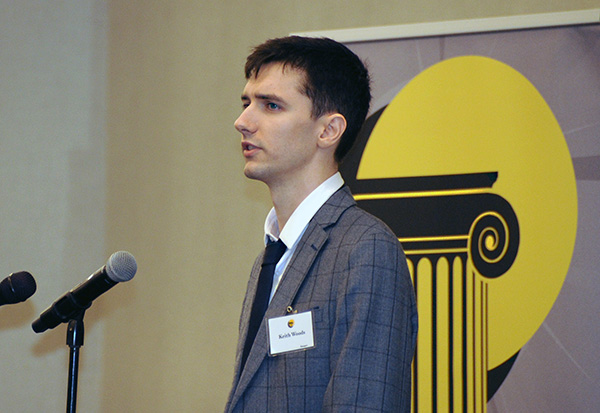
For such a small country, Ireland has outsized cultural importance, not least because of the large numbers of Americans who trace their ancestry to the Emerald Isle.
Mr. Woods argued that “denationalization” in Ireland began with the effort by the upper middle class in Dublin, a city that is economically and socially different from the rest of Ireland, to show its distinctiveness and social superiority over others. He said the tendency of white people to signal social status by deconstructing everything that is ordinary seems to be a unique cultural trait (and perhaps weakness) of white people. He cited the late Roger Scruton’s concept of “oikophobia” – the hatred of home. The loss of religious faith leads some intellectuals to lose their “priestly” status and seek a new ideological justification for their position, based on a feeling of superiority and alienation from the native culture. Intellectuals and others use “luxury beliefs” to separate themselves from the rest of the country and assert higher social status and transcendence of sectarian conflict.
In the 1960s, instead of preserving and strengthening a homeland for the Irish people, successive governments based their legitimacy on delivering economic growth. However, that growth came at a cost, including skyrocketing rates of suicide, homicide, and alcohol abuse. Citing The Globalization of Addiction, Mr. Woods argued that addiction is often a way to cope with de-territorialization, with whites now adapting to dispossession just as American Indians did.
Despite overwhelming opposition to the mass immigration that now accompanies economic globalization, Irish political parties refuse to listen. The “nationalist” Sinn Féin party has redefined its own history, reframing its terrorist campaign not as one for national liberation against an occupying people but simply as a militant civil rights movement against restrictions on Catholics. (This fits well with Dr. Duchesne’s argument about the logical progression of liberal arguments). However, Mr. Woods offered hope for Ireland because he said there is no “faux” populist party that can serve as a safety valve to dissipate nationalist resistance. Instead, the political system will be forced to cope with a new force. Ultimately, the Right must be radically reconstituted to face this mortal threat to the Irish nation.
Steven McNallen began his speech with his Eight Words: “The existence of my people is not negotiable.” Mr. McNallen is probably the most influential figure in the revival of the native European faith centered on the figure of Wotan (Odin to the Scandinavians and Woden to the Saxons). Mr. McNallen drew on the theories of psychologist Carl Jung, who argued that distinct peoples and nations share a collective unconscious that can be dominated by certain archetypes. Wotan, Jung argued in 1936, had possessed the German nation as it fell into decadence and subjugation during the Weimer Era, an era similar to our own. Wotan has two key characteristics: fury and wisdom. Fury led to the fratricidal tragedy of the Second World War and the even further degradation of Germany. Thus, wisdom will be the key in the new postwar era. Amusingly, when Mr. McNallen began explaining the significance of Wotan, there was a deafening crash of thunder that prompted cheers.
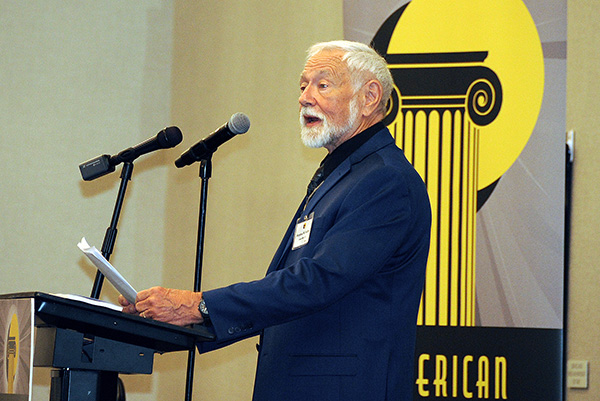
Mr. McNallen argued that Ragnarök is upon us, the Nordic equivalent of the Kali Yuga, but we need “runes rather than ruins” and “the mead of inspiration rather than a poison pill in the bunker.” He said that the revival of Germanic religion is constantly subjected “to the hatred of people who say they are against hate.” However, it is maturing and is no longer the simplistic, “Viking” style of the early years. Mr. McNallen said that Odin is Lord of the Spear and noted that warriors sometimes threw the spear over enemies, ritually sacrificing them to the god. To cast the spear today is to take effective action on behalf of our people, to “do” rather than merely to believe. He called on the audience to “become more than what we are,” and to “deserve life and deserve victory.” “Wokeness is weakness,” he said, “and weakness is death for the individual and the group.”
Estonian patriot Ruuben Kaalep began his speech by citing his long history of activism, despite his young age, and rejected the torrents of criticism he faced from the last time he spoke at American Renaissance (2016): “I still stand by every word I said.” However, as a poet as well as a politician, he argued that politics is only the most outwards expression of ethnonationalism. He explained his own concept of ethnofuturism, saying that it “creates and restores rather than defends and preserves.” A connection to one’s ancestors and native land, he argued, allows us to sense the harmony between the interplay of opposites. Through it, we can transcend postmodernism, which deconstructs the foundation of its own existence. It also allows us to overcome the “sad” fate of those who reject their own ethnic heritage and thereby reject a part of themselves.
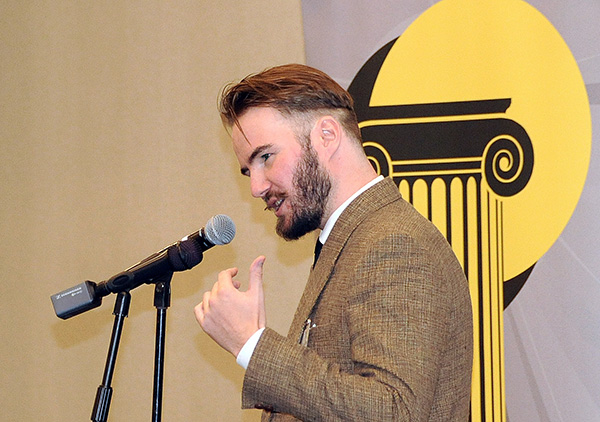
With a poet’s love of complexity, he argued that we shouldn’t lose ourselves in the quest for absolute, objective truth, and rejected the idea of superior nations: “Each nation is perfect according to its own standards.” Instead, he called for the audience to embrace the dance of chaos and order. Nationalism, like true love, does not need to be validated, for true nationalism is true love.
Mr. Kaalep’s speech was also rooted in contemporary struggles. He said that nations face the dual threat of globalism and imperialism. Russia, he argued, is continuing the Soviet policy of trying to rebuild its sphere of influence. The dominant force within the European Union is also working to undermine nation-states; it must be overcome and defeated. He called on the audience to “guard against globalism and resist the lure of imperialism.” On a more personal level, it is through connection “to the soil and our forefathers [that] we align ourselves to the universal order, attuning to the sacred symphony of creation” and rediscovering the primordial essence and divine spark. “Our ethnic roots bring us to the very truth of existence,” he said. “Take fearless pride in who you are and where you come from.”
James Edwards addressed his third American Renaissance conference. He chronicled some of his past triumphs, and also acknowledged obstacles, including personal condemnation by the United States Congress. He also could not understand how he lost his Twitter account, after the Musk takeover. “Elon,” he said, “if you’re watching, Jared and I would like our accounts back, sir.” He offered a long-term, insider perspective on the American Right, saying that though he often hears that things are getting worse, many things are getting better. The Bush-Cheney dynasty, the Martin Luther King sycophancy of some of the Tea Parties, and some of the politically correct assumptions of the establishment conservative movement have collapsed. Much of the credit, he argued, belongs to Donald Trump.
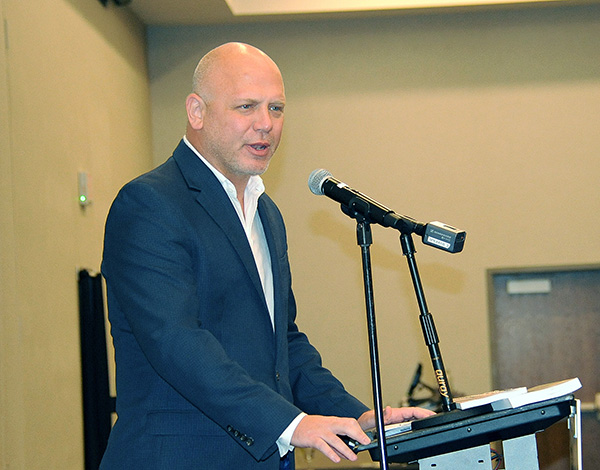
“Trump has desensitized people to charges of racism,” he said. The white middle class is showing signs of life, and politically correct conservatism is giving way to white identity politics. Once extreme ideas, such as abolishing the FBI, are now mainstream views in conservative circles. Polls indicate most Trump supporters are deeply worried about anti-white discrimination and candidates such as Governor Ron DeSantis cite the Kenosha Massacre as an “anti-white attack.” “Matt Walsh and Charlie Kirk are now saying the very things they were kicking people out of their meetings for saying just a few years ago,” he said, emphasizing that conservatives are scrambling to keep up with the grassroots.
Polarization, he argued, will intensify, especially because of government persecution of President Trump. “The Republic has never witnessed such a thing,” he said. Forces are speeding towards collision. He argued that the entire system is losing legitimacy and that the masses are poised for revolutionary change, with the idea of secession now increasingly popular. He warned, however, that there will be hard times ahead. “Whatever happens,” he said, “never betray a brother and never behave in a way that brings dishonor to our cause or to our people – especially when you are under attack.”
Dries Van Langenhove was the after-dinner speaker. He said that technological advances caught our rulers off guard. Using modern tools we can fight oppression, and we should welcome the struggle. This is because it gives Europeans – who are the product of millennia of hardship – real purpose. Fighting for our destiny is our reward; “Those who chase happiness will end up unhappy.”
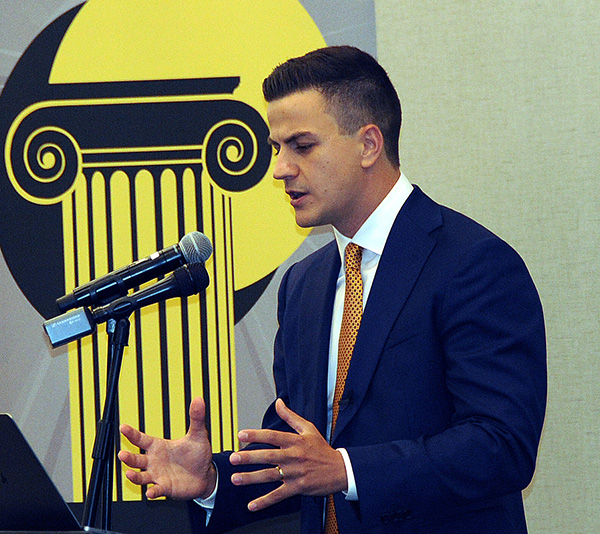
Mr. Van Langenhove chronicled his own impressive achievements. He has started the youth group Schild & Vrienden, boxing clubs, and a media channel. He has also served in the Belgian Senate. He urged the audience to take action instead of complaining, to become stronger and more dedicated. “Physical degeneration goes with mental degeneration,” he said, noting that only a healthy mind in a healthy body can tear down obstacles. He reminded us that our ancestors faced far worse odds and far more dangerous enemies. The path to victory is difficult but simple. It is to speak the truth and to have moral certainty, because we face a battle of “good versus evil, of those who want to build versus those who want to destroy.”
This is the greatest time to be alive, he said, because we always have a choice and we have more power than we think. We also have so much to gain and nothing to lose compared to those who “live for nothing and serve a system that hates them.” He ended with a call to ensure that “the lands of our ancestors remain the lands of our descendants.” “Our ancestors sacrificed everything,” he said, and we owe it to them to make them proud of us.
Gregory Hood spoke on “The Moral Necessity of White Nationalism.” He argued that the current system offers whites nothing. Those with higher status always avoid the consequences of egalitarianism. In education, health, law, and every other field, the pursuit of racial egalitarianism brings degeneracy. However, our ruling class of liars and cowards can never admit this.
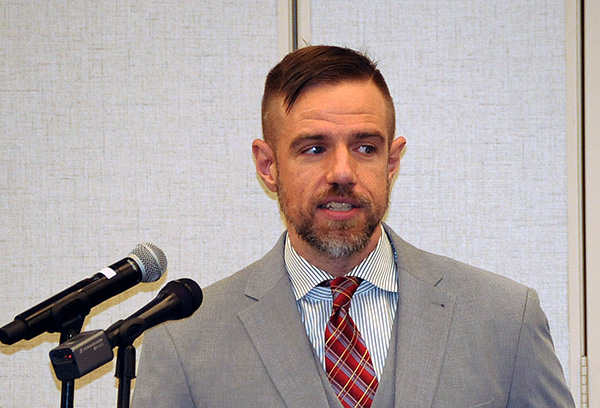
“All of American life revolves around earning enough money to escape the consequences of the civil rights movement,” he said. “It’s one giant intelligence test of avoiding legal traps, escaping compromised institutions and lying through your teeth about what you are actually doing.” Mr. Hood argued that such a system is intolerable for whites with any sense of dignity, and that we must explicitly work towards a state that safeguards our racial existence and higher development. White nationalism is not just moral, but a moral commandment. Identitarianism, built on three pillars — the Machiavellian tradition taught by James Burnham and Sam Francis, biology and evolutionary psychology, and the Traditionalist spiritual school — could provide the basis for the sorely needed Fourth Political Theory.
Jared Taylor reflected on decades of public activism and said that when he began American Renaissance in the 1990s, it was a kind of golden age for free speech. He said that CSPAN covered American Renaissance conferences, and he spoke on many college campuses and radio stations. His book Paved With Good Intensions was the Conservative Book Club’s monthly choice, and it was not alone. Books including Alien Nation, The Bell Curve, and The G Factor shaped the public debate about race.
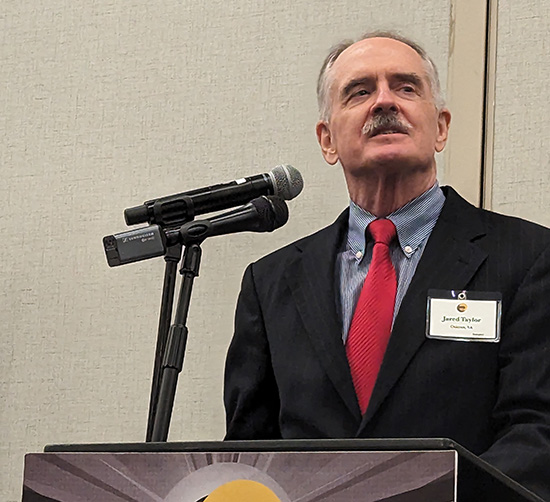
However, with the new century “the Iron Curtain came down with a clang.” The founder of the Human Genome Project’s assertion that there was no scientific basis to race heralded an age of willful ignorance, but the rise of an authentically free-speech internet brought us a “true marketplace of ideas.” This also did not last, not least because of the ferocious opposition of the conventional media. “In a leftist-liberal regime, censorship was inevitable,” but the election of Donald Trump was a turning point. In an internal document from Google called “The Good Censor,” the company suggested that it was time to ditch free speech and stop the wrong people from coming to power. Tech billionaires toyed openly with the idea that “If we can silence our opponents, we can rule the world.” Barack Obama called the internet the biggest threat to “Our Democracy.”
On May 25, 2020, George Floyd “ascended into heaven” and the result was explicitly anti-white riots that were the most destructive in American history. They were the inevitable results of a logical dilemma that has tortured liberals since the 1960s. If, after decades of equal and even special treatment, blacks cannot reach the level of whites, it must mean one of two things: Blacks are not equal, or white racism is vastly more complex and vicious than anyone thought.
Critical Race Theory solved the problem by inventing racism without racists, in the conventional sense. Whites oppress blacks unconsciously, through “systemic” and “institutional” racism. “White privilege” becomes a sweeping — and absurd — conspiracy theory that defines whites as inherent, incorrigible oppressors. Thus, said Mr. Taylor, “The denial of race differences in ability means whites stand eternally guilty of crimes for which, in the mind of liberals, the only appropriate punishment is extinction.” He added that conservatives have completely failed in their duty to oppose these destructive trends.
Though the future may appear dark, Mr. Taylor argued that “the censors are failing” and that intelligent white activists are building their own communities and taking over existing institutions. The system is dying even as it lashes out viciously. Mr. Taylor concluded by thanking AmRen supporters for permitting him to live a life of purpose: “I have the daily joy of doing my duty.”
Sam Dickson performed his traditional duty of closing the American Renaissance conference. He said we are fighting for the Western view of life against those who deliberately avoid reality. He argued that our opponents have a “religion that believes in defiance of reality, in defiance of the facts.” Mr. Dickson noted that this did nothing for blacks: “Dr. King’s program has radically failed.” He compared our situation to the demonstrators against the Soviet Empire who denounced “70 years on the road to nowhere.” However, bringing up inconvenient facts is called “hate.”
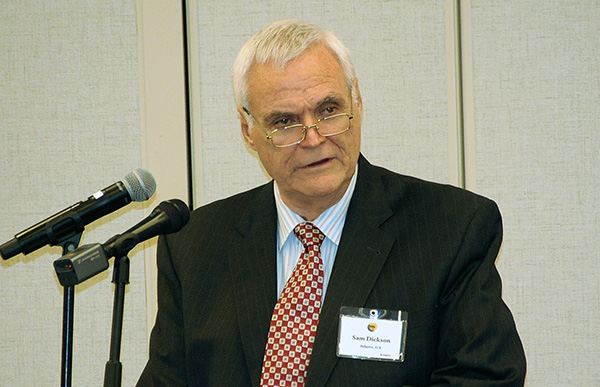
He warned the audience that egalitarians are quite willing to inflict violence against their political opponents and violate the rules of fair play. He also said that American law enforcement is sometimes complicit, specifically pointing out the conduct of police at Charlottesville in 2017. He reminded the audience of the Heaphy Report commissioned by the city of Charlottesville, which, to his surprise, told the truth: that the city’s black police chief refused to arrest left-wing antifa who attacked white demonstrators.
George Floyd’s death has been cynically used to incite blacks against whites. On the January 6 committee, then-Speaker Nancy Pelosi packed the body with Democrats as well as personally choosing the Republican members, including Liz Cheney.
Mr. Dickson heaped scorn on the dishonesty and corruption of the American government, but promised that reality will ultimately triumph. He cited his old Russian tutor, who was supremely confident that Communism in Russia would fall. Facts, reality, and science are all on our side. Our opponents “are on a collision course with reality” and cannot avoid disaster.
Most of the speakers argued that we need a philosophical system to deconstruct what has been done to our race. They laid out specific suggestions about how we can get there. There was a seriousness about the magnitude of the task we face. The white identity movement is past wishful thinking or naïve hopes. It has been tempered by past struggles and is ready to accept the battle to come.















